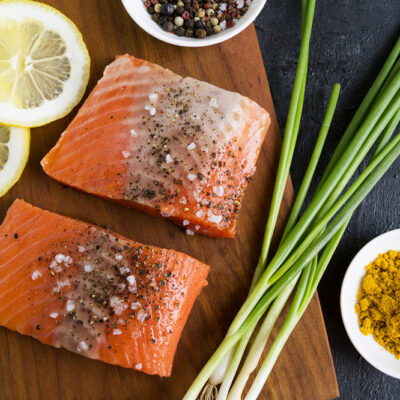
6 Foods to Help Reduce Menopause Symptoms
Menopause is a natural stage in a woman’s life. It is typically marked by the cessation of the menstrual cycle for a minimum of 12 months. Perimenopause marks the stage leading up to full menopause, with common symptoms including hot flashes, low libido, weight gain, and fatigue. While doctors may recommend hormone replacement therapy (e.g., Mirena) or herbal remedies (e.g., MenoEase) to help reduce the uncomfortable symptoms of menopause, certain foods can also help ease menopausal symptoms:
1. Blueberries
Blueberries are a commonly underestimated superfood, offering unique antioxidants that can fight free radicals and reduce inflammation. The fiber and essential vitamins present in these berries can improve gut health, as well as ease hot flashes and regulate mood. Due to their high antioxidant content, blueberries can also help lower high blood pressure, calming the anxiety often experienced by women in perimenopause and menopause. Try blending some blueberries into a smoothie or adding them to a salad.
2. Flax and chia seeds
These seeds are very high in omega-3 fatty acids, which can help to regulate hormones during perimenopause and menopause. Omega-3s can also help improve memory, regulate metabolism, and balance estrogen levels. Chia seeds are particularly good for the digestive tract, helping to reduce bloat and regulate blood flow. Try adding flax or chia seeds to your cereal or a smoothie. Flax seeds should be stored in the freezer or refrigerator to retain freshness.
3. Broccoli and cauliflower
These veggies fight free radicals, making them a great choice during menopause. Broccoli is full of fiber and several essential nutrients. Cauliflower, on the other hand, can be used to replace several common foods, such as pizza crust and mashed potatoes, offering a nutritious and delicious alternative. Most importantly, these veggies contain enzymes that assist in estrogen detoxification, easing the uncomfortable symptoms of menopause.
4. Spinach and kale
Spinach is full of vitamin E, which can help with dry skin. Kale, another common green, contains antioxidants, iron, calcium, and vitamins C and K. These greens can help to purify the blood and increase circulation. They also contain folic acid, a nutrient that can help with the insomnia reported by many women in perimenopause and menopause. These greens have also been shown to reduce the symptoms of hot flashes.
5. Yogurt
Yogurt is wonderful for digestion, as it contains live probiotics and beneficial bacteria. The calcium and vitamin D in yogurt can reduce the early onset of menopause, as well as limit symptoms of menopause once it manifests. It is a wonderful addition to any breakfast or snack. To maximize the health benefits of yogurt, be sure to choose a version with low levels of added sugars.
6. Fatty fish
Fatty fish, such as salmon, sardines, and herring, are great additions to a woman’s diet. The omega 3 fatty acids in these fish can decrease inflammation and are great for brain health. Omega-3s have also been shown to help ease anxiety and depression, which may sometimes accompany perimenopause. Women have also reported healthier skin and hair from consuming increased amounts of the omega-3s found in these fish.


